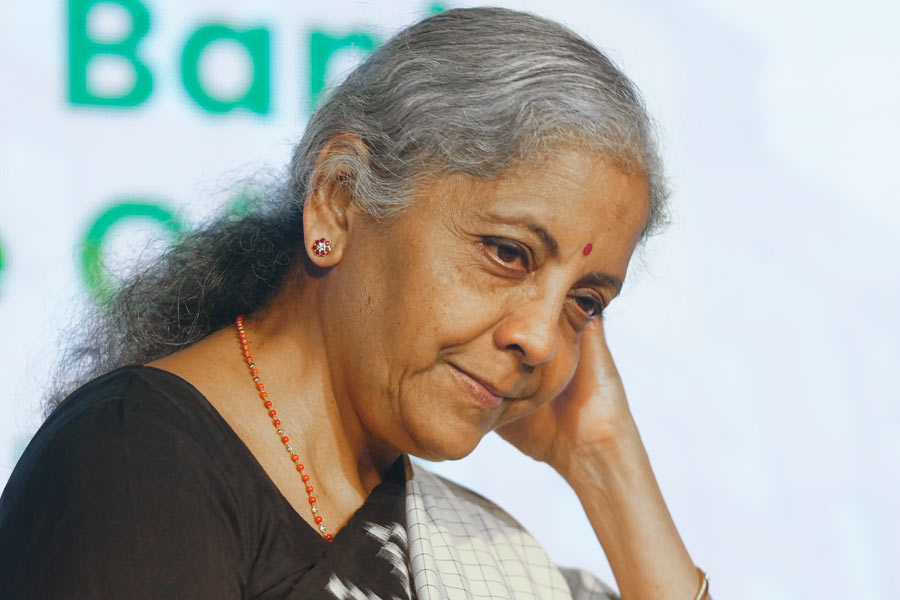 Tuesday, 28 January 2025
Tuesday, 28 January 2025
 Tuesday, 28 January 2025
Tuesday, 28 January 2025
Who is the most consequential resident of Bengal? Mamata Banerjee, you think? Think again.
The most consequential resident of Bengal lives and works not in the state capital Calcutta, but around 226 km away in a town called Jiaganj in Murshidabad. A town where horse-drawn carriages vie for space along with two-wheelers and four-wheelers; a town which still has only open drains.
For the years 2020, 2021, 2022, 2023 and 2024 his songs have been the most heard among all Indian musicians – living or dead – on the music streaming app Spotify. At least twice since August 2023, he has dethroned the world’s most popular singer, Taylor Swift, from the numero uno position on the same app, even if for just a day.
He rubbed Salman Khan the wrong way at an awards’ event and got away with it, following an apology, later retracted.
He moved court seeking protection for his name, voice, signature, photograph and other personality traits on finding artificial intelligence platforms were imitating him through algorithms. Despite the Bombay High Court ruling in his favour, websites offering “song generator” services to copy his voice are still available.
At the Everest of his career, he decided to leave Mumbai and work from his hometown instead and still stayed on the peak. Work-from-home could not have found a better voice.
If not touring, he is at home. He does not go anywhere. The world comes to his door.
Earlier this month, Dutch DJ and record producer Martin Garrix – ranked one among the top 100 DJs for three consecutive years – was at his Jiaganj residence.
His name is Arijit Singh.
Rank, name, fame, wealth, adulation, nothing seems to matter to India’s most famous contemporary musician, who prefers his sleepy hometown over the more business-like Mumbai. His family’s ties with the town run deep.
The Singhs of Jiaganj
Around seven years ago, Arijit Singh made Simple Note, a film that traced the life of Lalu, a young boy, and was set in Murshidabad in the aftermath of migration from then East Pakistan soon after India got Independence.
Lalu is identified as a musical prodigy and through the notes of music learns to deal with the highs and lows of life.
Like the story of Lalu, music and migration are integral to Arijit Singh’s life.
His great-grandfather, a trader from a village around 10km from Lahore, was a regular visitor to Behrampore in undivided India. In 1946, less than a year before the Partition of India, the family patriarch with his four sons and five daughters moved to Jiaganj, a town that he stumbled upon perchance, and decided to make it home. Jiaganj’s Panjabipara has been home to the Singhs for over seven decades.
One of the reasons behind the Singh family patriarch’s decision to quit Lahore was to get away from Pakistan. He did not realise his new home would be barely a few kilometres from East Pakistan, now Bangladesh.
“One night in August 1947, he was told to leave Jiaganj and Murshidabad as they would fall under East Pakistan,” recalls Gurdayal Singh, elder brother of Arijit’s father Surinder.
“A few hours later, the cops came home and said we need not go anywhere as Murshidabad will remain in India. We have lived here all our lives and never felt the need to move anywhere else. Except for a few hours on October 31, 1984 [the day Prime Minister Indira Gandhi was assassinated by her bodyguards], we have never faced any trouble,” says Gurdayal Singh.
Arijit calls him “jethu” – the Bengali word for father’s elder brother – instead of the Punjabi “bade papa“ or “taaya ji”.
Arijit Singh ‘has singing in his genes’
Nestled on the banks of the river Bhagirathi, Jiaganj is a circle that has been stretched a bit too long, with narrow roads and lanes all linked to each other. Like all small towns, everybody knows everybody.
The place is also loaded with history from the days of the Nawabs of Murshidabad, the numerous Marwari seths who made the town their homes and built schools and colleges.
“My mother used to sing Shabad kirtan at home. At our home, at the gurudwara [in Panjabipara, set up by the Singh elders in 1960]. Arijit’s mother was a trained singer,” says Gurdayal.
“He has it in his genes. When he started we had no idea he would achieve this level of fame. He was a good student but music towered over everything else.”
Over the decades the family has dabbled in many trades from moneylending to making and selling chanachur. They run a restaurant in Jiaganj’s main thoroughfare, called Heshel, which is always bustling.
Gurdayal and Arjit Singh’s father Surinder manage the restaurant with their staff, handling everything from the daily rounds to the market to the counter. They travel around in a two-wheeler. Just like Arijit does when he is in town.
Arijit Singh’s mother, Aditi, who died in 2021, gave him the nickname Som, which over the years became Somu.
The music student who became bigger than the teacher
In a lane off Jiaganj’s Hatibagan is a two-storey house with a garments store at the front. Past the mannequins and the rows of clothes is a room that has a sprawling bed with two harmoniums – on which sits an ailing Birendra Prasad Hazari.
Hazari’s face brightens at the mention of his most famous student.
“The singer Arijit is flawless,” declares Hazari, 75, with pride. “There could be some flaws in the person, but that is not for me to say.”
Arijit was around three years old when he started accompanying his mother to Murchhana, the music school run by the Hazari family where she was a student.
“He would sit on my lap while I taught his mother and other students and stare at the harmonium,” Hazari recalls.
“He could not pronounce ‘Sa’ yet. The note ‘Sa’ sounded as ‘Ta’. That ‘Ta’ was in sur [tune]. In another two years he had learnt to play the harmonium,” says Hazari, who teaches songs of Rabindranath Tagore and modern Bengali songs.
The youngest Hazari brother, he has taught about a thousand students including Arijit’s late mother and Arijit’s younger sister, Amrita.
“I have never come across a singer as talented as him. Many of my students have earned name and fame but there has been only one Arijit,” the teacher says.
His elder brothers – Rajendra Prasad and Dhirendra Prasad – taught Arijit classical music and the tabla. The first raga that Arijit Singh learnt was Iman aka Yaman, recalls his teacher.
Like the Singhs, the Hazaris too are migrants. Some four centuries ago, the Hazari family moved to Debipur, a village close to Jiaganj, from Uttar Pradesh’s Jhansi.
The boy who skipped school, stole fish
At the Hazaris’ Debipur house, Arijit, then a student at Jiaganj’s Raja Bijay Singh Vidyamandir, would drop in frequently, often skipping school.
“He would barge in and ask for pora-ruti [chapati]. We had a water reservoir at the Debipur house. He would sit on the edge with his legs in the tank and play with the fish,” says Alpana, wife of Birendra Prasad Hazari and chhor-dida to Arijit.
One afternoon, recalls Alpana, Arijit picked up some fish from the reservoir and ran home ignoring her calls. At home, his mother suspected something was amiss and observed the wet, bulging pocket.
“His mother asked, ‘Did you bring these without telling them?’ He nodded yes. When he was sent to our home again, some of the fish had died while others barely survived. He could be naughty but never disobedient. Otherwise, he was completely immersed in music,” Alpana says with a smile.
In Jiaganj’s Churi Patty is a single-screen theatre, Lakshmi Talkies. Hazari remembers one incident at the theatre where Arijit, around nine years old, was to perform representing Murchhana for an event that was held to felicitate the (now former) member of Parliament from neighbouring Berhampore, Adhir Ranjan Chowdhury.
“Arijit was standing on top of a platform when he lurched and almost fell down. Those around him were alert and saved him,” recalls Hazari. “He did not take long to recover and went on to perform at the event.”
When he is in Jiaganj, Arijit still drops by at his teacher’s home on some afternoons, though not as frequent a visitor as he once was.
“He tells us, tomra eso [you come over]. We understand it is difficult for him,” says Alpana.
The star of Jiaganj
The afternoon we meet the Hazari family and try to reach Gurdayal and Surinder at Heshel, near Shibtalaghat where Arijit’s home is, a group of youngsters is waiting on the road to get a glimpse of their Dada – as most youngsters in Jiaganj refer to Arijit as.
Unlike the filmi bungalows in Mumbai’s Juhu and Bandra (West), there is hardly any space in this lane off Shibtalaghat, which has a few temples and a banyan tree – ancient and huge like all banyan trees.
Arijit’s is the second house in the lane, with plenty of windows and balconies on both sides. The house is impenetrable. If the main gate opens, one can see the bouncers seated inside with a sharp eye on the door.
There is also a closed-circuit television camera installed at a side door.
At the studio that Arijit has built in Jiaganj, where he spends most nights working on his music, only a handful of people have biometric access. Others, including his father and jethu, have to wait till they are allowed in.
The previous afternoon, two of these youngsters had seen Arijit Singh leave in a two-wheeler and tried to follow, but were stopped in their tracks. So that day, they have returned with some more friends, all from Lalgola around 24 km away, expecting to catch a glimpse.
Another young man, who is from Farakka but studies at the local Sripat Singh College, stops by every afternoon with a soft prayer to see Dada once. He hasn’t succeeded yet.
Till some years ago, Arijit was a regular at Shibtalaghat along with his childhood friends, chatting with the locals. Those visits have become a rarity now.
Somnath Das, a tea-shop owner at Shibtalaghat is waxing eloquent on religion and love with a group of locals when we ask him about Arijit.
“Agey aasto, dekha hoto, akhon hoy na [Earlier he would drop by, now not so much],” says Das.
There are videos on the internet of Arijit going to the local market to buy groceries and household stuff. Those visits, too, have been curtailed now. Some locals at Shibtalaghat say that late in the night he can still be spotted moving around town in his two-wheelers.
Arijit Singh: Simple. Candid. Difficult
Arijit Singh’s reticence is legendary. In September 2016, when he finally agreed to appear on Kapil Sharma’s show, the show opened with a spoof on the singer’s reluctance to appear on such platforms.
One of the characters – played by the actor Ali Asghar in drags – walked in with a fake Arijit and said she could not recognise him as Arijit is a playback singer and is not much seen on television, though it was a television reality show, Fame Gurukul, that gave him the first break 20 years ago.
In the same programme, Arijit said, the composer trio of Shankar-Ehsan-Loy gave him the first break, followed by Mithun .
In Jiaganj, he has attained a God-like status. Not everyone in the Hindi film industry thinks of him the same way, though they all acknowledge him as decent.
“Working with Arijit Singh is a painful experience. There are frequent delays in recordings. Although Arijit is a gem of a human being, he is unprofessional when it comes to work,” says an industry insider who does not want to be named.
The veteran filmmaker Mahesh Bhatt does not agree. It was in Mohit Suri’s Aashiqui2, produced by Bhatt in 2013, that Arijit met instant recognition and acclaim; specially with the chartbuster Tum Hi Ho.
“When you work with a talent like Arijit, you cannot slot him; he does not fit into the assembly-line definition,” Bhatt says.
“One of our tallest singers, Kishore Kumar was known for his unpredictable behavior; but when he entered the recording room everything else disappeared and all of us would be left mesmerised. Performers are human beings and living entities. Each human being is different. If external discipline is imposed they cannot fit in. If that is seen as a blemish, then one is looking at the dark spots in the moon. Human beings have their foibles and frailties. Arijit is an asset and he should be celebrated,” he adds.
Bhatt believes Arijit’s small-town upbringing has shaped the singer and the person.
“I personally feel the man is the style, and you cannot separate the two,” Bhatt says. “His versatility spans across genres. He has earned the admiration of his peers. His profound connection with his roots has helped his journey. Coming from a small town, his candidness resonates in his music. His defining attributes are his dedication and authenticity. His music comes from his soul and touches the listeners.”
Mumbai to Murshidabad, a singer’s journey
It has been close to a decade since Arijit decided to pack his bags and move back to Jiaganj while working on his music. There was a reason behind that decision.
He had reportedly received calls from a close aide of gangster Ravi Pujari. A veteran actor with close ties to Bengal is believed to have helped Arijit strike a deal. India’s top singer had to sing five songs in Dubai at an event for free.
To those close to him, Arijit has said he has found peace in Jiaganj.
“He feared the demands would not stop,” says someone close to the singer.
Arijit Singh still owns a few homes and his office runs from India’s commercial capital. In Jiaganj, there is another team of around 20 people, mostly local lads, who work for him.
Jiaganj has given Arijit another purpose: How to improve the lives of the town folks.
He has identified two areas – education and health. Since the pandemic five years ago, which destroyed millions of lives across the globe, Arijit has been quietly helping individuals. Neither he nor those working with him have spoken much on this and still do not.
He wants to set up a modern healthcare facility in Jiaganj but availability of land has come in the way. Those who are aware of Arijit’s passion project say he was offered a piece of land in Jangipur, almost 40 km from his home, but he turned it down as the distance would not have helped the people of Jiaganj.
Work in the education sector has been comparatively easier though not without challenges.
He has been trying to convert the Raja Bijay Singh Vidyamandir – the same school where he studied; he is the president of the school’s management board – into an English-medium school. The file is with the state school education board.
Arijit Singh has also salvaged a playground that was being encroached upon, and preserved it. Inside the school he has helped arrange funds for repairing classrooms, providing basic amenities like toilets. He is working to redesign the auditorium with air-conditioners and latest acoustics.
His teachers Sumita Lahiri, Kamalesh Shaw and Ashish Chakraborty shower praises on him, describing him as “down-to-earth” and “emotional”.
“He is the managing board’s president but when he comes to attend the meetings he refuses to sit. In all these years, he did not forget any one of us,” says Shaw, who has been teaching Hindi at Raja Bijay Singh Vidyamandir for the last 30 years.
“We could not have saved the playground. There was little help from the government,” chips in Chakraborty, who teaches Bengali in the same school and is a family friend of the Singhs.
The board meetings are fixed according to his schedule and never during the school hours.
Sumita Lahiri, who taught Arijit English, says that while others aim to reach the sky, the sky has reached out to him.
Jiaganj cannot have enough of Arijit Singh. Clearly, neither can his millions of fans.







